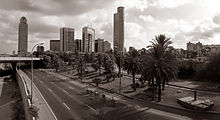- Hiloni
-
 Cyclists ride down the deserted Ayalon Highway in Tel Aviv on Yom Kippur
Cyclists ride down the deserted Ayalon Highway in Tel Aviv on Yom Kippur
Hiloni (Hebrew: חִלּוֹנִי), plural hilonim (Hebrew: חִלּוֹנִים) derived from the Hebrew word hulin, meaning secular or mundane, is the term used in Israel for non-religious Jews.[1]
As natives of Israel, hilonim speak Hebrew. As Israel is a Jewish state, many hilonim observe national holidays and customs, such as Israel's Independence Day, and Holocaust Remembrance Day.
Contents
History of secularism in Israel
The concept of Modern-day Political Zionism, in itself, was founded largely upon secular beliefs and values. Theodor Herzl, founder of the Modern Day Zionist movement, was an assimilated Austrian Jew. At first, most of those immigrating to Palestine were Orthodox Jews who immigrated due to the holiness of the land and their wish to be buried in Jerusalem (due to the belief that The Messiah will resurrect those interred in Jerusalem first before the rest of the world). With the onset of numerous pogroms throughout Eastern Europe, many Jews citing security, freedom of religion, and strong Zionist affinities left their surrogate lands to settle in their native homeland, the Land of Israel. During the first wave (1882–1903) of Zionist aliyah, and especially during the Second Aliyah (1904–1914) the Jewish population of Ottoman Palestine, consisting mainly of secular or nontraditional Jews, greatly increased. These Olim founded cities such as Tel Aviv and established kibbutzim which were based around ideas of socialism, not necessarily connected to Judaism as a religion or a set of values. As the number of new immigrants increased so did the proportion of secular Jews. Up to, and during the Establishment of The State of Israel, the number of religious Jews was relatively minor.
By 1987, Thomas Friedman had estimated that the breakdown was 45% secular, 35% traditional, 15% dati and 5% haredi.[2]
Culture
Main article: Secular Jewish culture#Hebrew and Israeli theatreConflict with observant (or more traditional) Jews
Main article: Religion in IsraelThe Hilonim of Israel are embroiled in many disagreements with the religious, namely Haredi, population. The conflicts resonate from the Haredim's unwillingness to serve in the IDF, the Haredi groups that oppose the state of Israel, the Haredi lobby's support of the ban on pork in Israel,[3] and the mandatory closing of all stores on Shabbat.
See also
References
- ^ "Judaism 101 movements of Judaism". JewFAQ. JewFaq.org. 2008-08-01. http://www.jewfaq.org/movement.htm.
- ^ Thomas L. Friedman. "THE ISRAELI JEWS: 4 DISTRICT CAMPS", The New York Times, June 29, 1987. Accessed August 1, 2008.
- ^ "Israeli Supermarkets to Outlaw Pork". Time Magazine. Time Warner. 2008-08-01. http://time-blog.com/middle_east/2007/06/israeli_supermarkets_to_outlaw.html.
Religion in Israel Secular-Traditional spectrum Hiloni · Shomer MasoretDati Orthodox spectrum Categories:- Demographics of Israel
- Zionism
- History of Israel
- Aliyah
- Religion in Israel
- Israeli culture
- Israeli people
Wikimedia Foundation. 2010.
